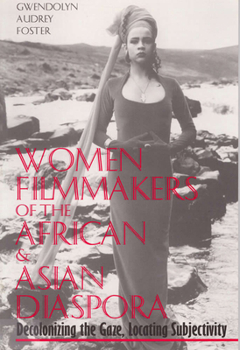Women Filmmakers of the African & Asian Diaspora: Decolonizing the Gaze, Locating Subjectivity
Select Format
Select Condition 
Book Overview
Black women filmmakers not only deserve an audience, Gwendolyn Audrey Foster asserts, but it is also imperative that their voices be heard as they struggle against Hollywood's constructions of... This description may be from another edition of this product.
Format:Paperback
Language:English
ISBN:0809321203
ISBN13:9780809321209
Release Date:May 1997
Publisher:Southern Illinois University Press
Length:192 Pages
Weight:0.70 lbs.
Dimensions:0.6" x 6.0" x 9.0"
Customer Reviews
1 rating
Women Filmmakers of the African and Asian Diaspora
Published by Thriftbooks.com User , 18 years ago
Black women filmmakers not only deserve an audience, Gwendolyn Audrey Foster asserts, but it is also imperative that their voices be heard as they struggle against Hollywood's constructions of spectatorshhip, ownership, and the creative and distribution aspects of filmmaking. Foster provides a voice for these women in the first detailed examination of the works of six contemporary Black and Asain women filmmakers. In this illustrated work, she also includes a detailed introduction and a chapter entitiled "Other Voices," documenting the work of other Black and Asian Filmmakers. Foster analyzes the key films of Zeinabu irene Davis, Ngosi Onwurah, Julie Dash, Pratibha Parmar, Trinh T. Minh-ha, and Mira Nair. She sees Davis as "one of the growing number of independent Black women filmmakers who are actively constructing 'an oppositional gaze,' a term bell hooks uses to describe films that look through/at African-American female experiences through a Black les. " her films "Seek to reclaim female subjectivity through (re)construction of time, the body, and an exploration of spacial configurations." Like Davis, British filmmaker Onwarah deals with time and space, embracing "Heterogeneity and multiple sites of subjectivity." Challenging the limits of narrative and ethnographic cinema, she insists that the "body is the central landscape of an anti-imperialist cinematic discourse." Dash, too, reconsiders time and space as she celebrates the Black body and African-American cultural diversity. Her Daughters of the Dust "challenges Hollyood's narrative techniques that typically ignore African-American history, particularly Black women's history. Palmar, a Kenyan/Indian-born British Black filmmaker, is concerned with issues of representation, identity, cultural displacement, lesbianism, and racial identity. She demands that women no longer be invisible, silent ad supressed. Vietnamese born Minh-ha revolutioized documentary filmmaking by displacing the "voyeuristic gaze of the ethnographic documentary filmmaker." Ethnographic filmmaking, she argues, does not "objectively represent the Third World subject." Nair, a Black Indian woman filmmaker, concentrates of racial identity. A pioneer in both narrative and documentary films, her challenging, celebratory work includes the recent productions Mississippi Masala and The Perez Family. --- from book's back cover





